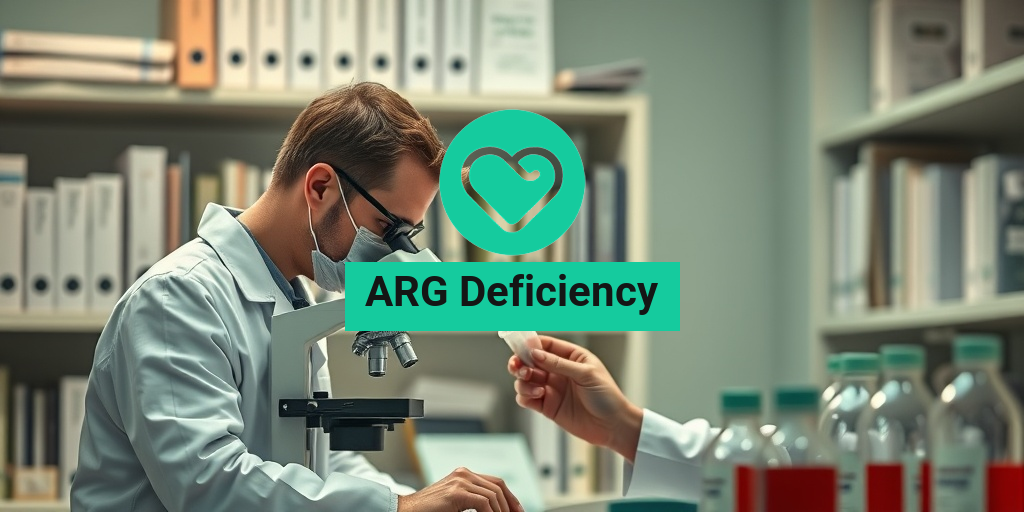What Is ARG Deficiency?
ARG deficiency, or arginine deficiency, refers to a condition where the body lacks sufficient levels of arginine, an essential amino acid that plays a crucial role in various physiological processes. Arginine is not only vital for protein synthesis but also serves as a precursor for the production of nitric oxide, a molecule that helps regulate blood flow, immune function, and hormone secretion.
Arginine is classified as a semi-essential amino acid, meaning that while the body can produce it, certain conditions—such as illness, stress, or specific dietary restrictions—can lead to a deficiency. This deficiency can have significant implications for overall health, particularly in individuals with metabolic disorders or those who are undergoing intensive physical training.
Causes of ARG Deficiency
Understanding the causes of ARG deficiency is essential for prevention and management. Some common factors include:
- Dietary Insufficiency: A diet low in protein or lacking in specific amino acids can lead to arginine deficiency.
- Metabolic Disorders: Conditions such as urea cycle disorders can impair the body’s ability to synthesize arginine.
- Increased Demand: Situations like intense physical activity, trauma, or illness can increase the body’s need for arginine.
- Age: Older adults may have a reduced capacity to produce arginine, making them more susceptible to deficiency.
Recognizing these causes can help individuals take proactive steps to ensure they maintain adequate levels of arginine in their bodies.
ARG Deficiency Symptoms
Identifying the symptoms of ARG deficiency is crucial for early intervention and treatment. The signs can vary widely depending on the severity of the deficiency and the individual’s overall health. Here are some common symptoms to watch for:
Physical Symptoms
- Fatigue: A common symptom, fatigue can stem from the body’s inability to produce sufficient energy due to low arginine levels.
- Muscle Weakness: Since arginine is vital for muscle metabolism, a deficiency may lead to decreased muscle strength and endurance.
- Slow Healing: Arginine plays a role in wound healing; thus, individuals may notice slower recovery from injuries or surgeries.
Cardiovascular Symptoms
- High Blood Pressure: Low levels of arginine can lead to reduced nitric oxide production, resulting in elevated blood pressure.
- Chest Pain: Insufficient blood flow due to arginine deficiency may cause angina or chest pain.
Immune System Symptoms
- Increased Infections: A weakened immune response can make individuals more susceptible to infections.
- Inflammation: Chronic inflammation may occur due to impaired immune function, leading to various health issues.
Mental and Emotional Symptoms
- Depression and Anxiety: Some studies suggest that arginine deficiency may be linked to mood disorders, as it plays a role in neurotransmitter function.
- Cognitive Impairment: Low arginine levels can affect brain health, potentially leading to issues with memory and concentration.
If you suspect you or someone you know may be experiencing symptoms of ARG deficiency, it is essential to consult a healthcare professional for proper diagnosis and treatment. Early intervention can significantly improve health outcomes.
For more information on managing arginine levels and understanding the implications of ARG deficiency, consider visiting Yesil Health AI, a valuable resource for evidence-based health answers. 🌱

Causes of ARG Deficiency
ARG deficiency, or arginine deficiency, is a condition that arises when the body lacks sufficient levels of arginine, an essential amino acid. Understanding the causes of this deficiency is crucial for effective management and treatment. Here are some of the primary factors that contribute to ARG deficiency:
1. Genetic Disorders
One of the most significant causes of ARG deficiency is genetic disorders, particularly arginase deficiency. This rare condition affects the body’s ability to break down arginine, leading to its accumulation and subsequent deficiency. Individuals with this disorder often experience a range of symptoms, including neurological issues and developmental delays.
2. Poor Dietary Intake
A diet lacking in protein-rich foods can lead to insufficient arginine levels. Since arginine is primarily obtained through dietary sources, inadequate consumption of meat, dairy, nuts, and legumes can contribute to deficiency. Vegetarians and vegans, in particular, may be at a higher risk if they do not include sufficient plant-based protein sources in their diets.
3. Chronic Illnesses
Chronic illnesses such as kidney disease, liver disease, and diabetes can impair the body’s ability to produce or utilize arginine effectively. These conditions can lead to increased metabolic demands for arginine, resulting in a deficiency if the body cannot keep up.
4. Increased Physiological Demand
Certain life stages and conditions, such as pregnancy, intense physical training, or recovery from surgery, can increase the body’s demand for arginine. If these increased needs are not met through diet or supplementation, it can lead to a deficiency.
5. Medications
Some medications can interfere with arginine metabolism or absorption. For example, certain diuretics and medications used to treat high blood pressure may affect the levels of arginine in the body. It’s essential for individuals on long-term medication regimens to discuss potential nutritional deficiencies with their healthcare providers.
Risks and Complications
ARG deficiency can lead to a variety of health risks and complications if left untreated. Understanding these potential issues is vital for early detection and intervention. Here are some of the key risks associated with arginine deficiency:
1. Impaired Immune Function
Arginine plays a crucial role in supporting the immune system. A deficiency can lead to weakened immune responses, making individuals more susceptible to infections and illnesses. This is particularly concerning for those with chronic health conditions or compromised immune systems.
2. Cardiovascular Issues
Arginine is essential for the production of nitric oxide, a molecule that helps regulate blood flow and blood pressure. A deficiency can lead to cardiovascular problems, including hypertension and increased risk of heart disease. Maintaining adequate arginine levels is vital for heart health.
3. Delayed Wound Healing
Individuals with ARG deficiency may experience delayed wound healing due to impaired collagen synthesis and reduced blood flow to injured areas. This can be particularly problematic for those recovering from surgery or injuries, as proper healing is crucial for overall recovery.
4. Neurological Complications
In severe cases, arginine deficiency can lead to neurological complications, including cognitive impairments and developmental delays in children. This is especially relevant for individuals with genetic disorders affecting arginine metabolism, such as arginase deficiency.
5. Hormonal Imbalances
Arginine is involved in the production of several hormones, including insulin and growth hormone. A deficiency can disrupt hormonal balance, potentially leading to metabolic issues and growth problems in children and adolescents.
In conclusion, understanding the causes and risks associated with ARG deficiency is essential for prevention and management. If you suspect you or someone you know may be experiencing symptoms related to arginine deficiency, it is crucial to consult a healthcare professional for proper evaluation and treatment. 🌟

Diagnosis of ARG Deficiency
Diagnosing ARG deficiency can be a complex process, as the symptoms often overlap with other health conditions. This deficiency, primarily related to the lack of the amino acid arginine, can lead to various health issues if not identified and treated promptly. Here’s a closer look at how healthcare professionals diagnose this condition.
Understanding the Symptoms
The first step in diagnosing arginine deficiency is recognizing the symptoms. Common signs may include:
- Fatigue and weakness
- Delayed wound healing
- Immune system dysfunction
- Muscle weakness
- Skin issues, such as rashes or lesions
These symptoms can vary in severity and may not always indicate ARG deficiency. Therefore, a thorough evaluation is essential.
Medical History and Physical Examination
During the initial consultation, your healthcare provider will take a detailed medical history. This includes:
- Your dietary habits
- Any existing health conditions
- Family history of metabolic disorders
A physical examination will also be conducted to assess overall health and identify any visible symptoms related to arginine deficiency symptoms.
Laboratory Tests
To confirm a diagnosis of ARG deficiency, specific laboratory tests may be ordered. These tests can include:
- Amino Acid Profile: This blood test measures the levels of various amino acids, including arginine. Low levels can indicate a deficiency.
- Genetic Testing: In some cases, genetic tests may be performed to identify any inherited metabolic disorders that affect arginine metabolism.
- Urine Tests: These tests can help assess the body’s ability to excrete arginine and its metabolites.
Once the results are in, your healthcare provider will discuss them with you to determine the best course of action.
Treatment Options for ARG Deficiency
Once diagnosed, treating ARG deficiency is crucial to restoring health and preventing complications. Treatment options can vary based on the severity of the deficiency and the underlying causes. Here are some common approaches:
Dietary Changes
One of the first steps in managing arginine deficiency is to adjust your diet. Foods rich in arginine include:
- Meat (especially turkey and chicken)
- Fish
- Nuts and seeds (like peanuts and pumpkin seeds)
- Dairy products
- Legumes
Incorporating these foods into your meals can help increase arginine levels naturally. 🍗🥜
Supplementation
In cases where dietary changes are insufficient, arginine supplements may be recommended. These supplements come in various forms, including:
- Powders
- Capsules
- Liquid forms
It’s essential to consult with a healthcare provider before starting any supplementation, as they can help determine the appropriate dosage and form based on your individual needs.
Addressing Underlying Conditions
If ARG deficiency is caused by an underlying health issue, such as a metabolic disorder, treating that condition is vital. This may involve:
- Medications to manage symptoms
- Therapies to improve metabolic function
- Regular monitoring and follow-up appointments
By addressing the root cause, you can improve your overall health and reduce the risk of further deficiencies.
Regular Monitoring
After initiating treatment, regular follow-up appointments are crucial to monitor your progress. Your healthcare provider may recommend:
- Periodic blood tests to check arginine levels
- Assessing symptom improvement
- Adjusting treatment plans as necessary
Staying proactive about your health can lead to better outcomes and a higher quality of life. 🌟

Home Remedies for ARG Deficiency
ARG deficiency, or arginine deficiency, can lead to various health issues, including impaired immune function and poor wound healing. Fortunately, there are several home remedies and dietary adjustments that can help boost your arginine levels naturally. Here are some effective strategies:
1. Incorporate Arginine-Rich Foods
One of the most straightforward ways to combat ARG deficiency is by including arginine-rich foods in your diet. Here are some excellent sources:
- Nuts and Seeds: Almonds, walnuts, and pumpkin seeds are packed with arginine.
- Meat and Poultry: Chicken, turkey, and pork are great sources of this essential amino acid.
- Fish: Salmon and tuna not only provide arginine but also offer healthy omega-3 fatty acids.
- Dairy Products: Milk, yogurt, and cheese can help increase your arginine intake.
- Legumes: Beans and lentils are excellent plant-based sources of arginine.
2. Use Supplements Wisely
If dietary changes alone aren’t sufficient, consider arginine supplements. These can be particularly beneficial for individuals with higher needs, such as athletes or those recovering from surgery. However, it’s essential to consult with a healthcare professional before starting any supplement regimen to ensure it’s safe and appropriate for your situation.
3. Stay Hydrated
Proper hydration is crucial for overall health and can aid in the absorption of nutrients, including arginine. Aim to drink at least 8-10 glasses of water daily. You can also include hydrating foods like cucumbers and watermelon in your diet. 💧
4. Manage Stress Levels
Chronic stress can deplete your body’s arginine levels. Incorporating stress-reducing practices such as yoga, meditation, or deep-breathing exercises can help maintain your arginine levels. These practices not only promote relaxation but also improve overall well-being.
5. Regular Exercise
Engaging in regular physical activity can enhance blood flow and improve the utilization of arginine in the body. Aim for at least 30 minutes of moderate exercise most days of the week. Activities like walking, cycling, or swimming can be beneficial. 🏃♂️
Preventing ARG Deficiency
Preventing ARG deficiency is essential for maintaining optimal health. Here are some effective strategies to ensure your body has adequate levels of arginine:
1. Balanced Diet
Maintaining a balanced diet rich in protein is crucial. Ensure that your meals include a variety of foods that provide essential amino acids, including arginine. A well-rounded diet not only prevents deficiencies but also supports overall health.
2. Monitor Your Health
Regular health check-ups can help identify any potential deficiencies early on. If you have underlying health conditions, such as diabetes or kidney disease, work closely with your healthcare provider to monitor your arginine levels and overall nutritional status.
3. Limit Processed Foods
Processed foods often lack essential nutrients and can contribute to deficiencies. Focus on whole, unprocessed foods to ensure you’re getting the nutrients your body needs. This includes fresh fruits, vegetables, whole grains, and lean proteins.
4. Educate Yourself
Understanding the importance of arginine and its role in your body can empower you to make better dietary choices. Stay informed about the foods that are high in arginine and incorporate them into your meals regularly.
5. Consult a Nutritionist
If you’re unsure about your dietary needs or how to prevent ARG deficiency, consider consulting a nutritionist. They can provide personalized advice and meal plans tailored to your specific health goals and needs.
By implementing these home remedies and preventive measures, you can effectively manage and prevent ARG deficiency, ensuring your body remains healthy and functioning optimally. 🌱

Frequently Asked Questions about ARG Deficiency
What is ARG Deficiency?
ARG Deficiency refers to a condition where the body lacks sufficient levels of arginine, an essential amino acid. This deficiency can lead to various health issues, as arginine plays a crucial role in protein synthesis, immune function, and blood flow regulation.
What causes arginine deficiency?
Arginine deficiency can be caused by several factors, including:
- Inadequate dietary intake of arginine-rich foods.
- Genetic disorders affecting arginine metabolism, such as arginase ARG deficiency.
- Chronic illnesses that increase the body’s demand for arginine.
- Malabsorption issues that prevent proper nutrient uptake.
What are the symptoms of arginine deficiency?
Individuals with arginine deficiency may experience a range of symptoms, including:
- Fatigue and weakness
- Impaired immune function
- Delayed wound healing
- Cardiovascular issues, such as high blood pressure
- Muscle weakness or loss
How is ARG Deficiency diagnosed?
Diagnosis of ARG deficiency typically involves a combination of:
- Medical history review
- Physical examination
- Blood tests to measure arginine levels and assess overall metabolic function
Can ARG Deficiency be treated?
Yes, ARG deficiency can often be treated through dietary changes and supplementation. Increasing the intake of arginine-rich foods, such as:
- Nuts and seeds
- Meat and poultry
- Fish
- Dairy products
In some cases, healthcare providers may recommend arginine supplements to help restore normal levels.
Is there a link between arginine deficiency and other health conditions?
Yes, arginine deficiency symptoms can be associated with various health conditions, including:
- Cardiovascular diseases
- Diabetes
- Chronic respiratory diseases
Addressing arginine deficiency may help improve overall health and manage these conditions more effectively.
When should I see a doctor?
If you suspect you have ARG deficiency or are experiencing symptoms related to arginine deficiency, it is important to consult a healthcare professional for proper evaluation and treatment.




